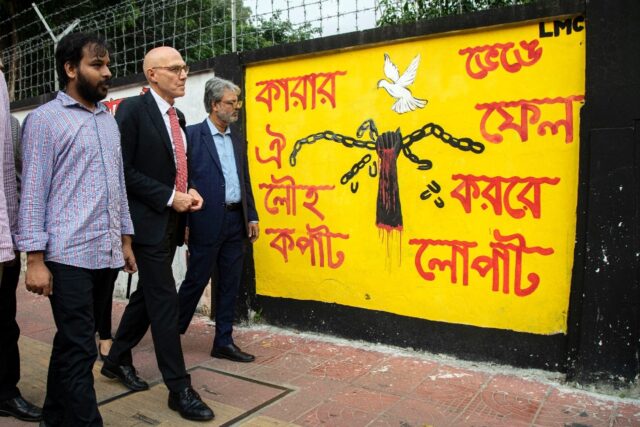UN rights chief Volker Turk on Tuesday urged students at Bangladesh’s Dhaka University, the heart of the uprising that toppled autocratic leader Sheikh Hasina, to “protect” democracy to end cycles of revenge.
“Democracy is one of the most powerful ideas ever dreamed up by humanity… but it is also fragile — something that we must nurture and protect –- particularly in its earliest stages,” Turk said in an address.
“I know you are aware of the pitfalls that led other pro-democracy movements into a dead end.”
Tens of thousands demonstrated on campus and in the surrounding neighbourhood as protests against job quotas morphed into a nationwide struggle to end Hasina’s 15 years of iron-fisted rule.
More than 700 people were killed, many in a brutal police crackdown, before Hasina fled to India by helicopter on August 5.
Several of the top student protest leaders were enrolled at the university, some of whom are now part of the cabinet of the interim government which is led by Nobel Peace Prize winner Muhammad Yunus.
Hasina’s rule saw widespread human rights abuses, including the mass detention and extrajudicial killings of her political opponents. A Bangladeshi court this month issued an arrest warrant for the ousted leader.
‘Pivotal time’
Turk told students they had “shown great courage in standing up for justice and equality”, and that he was honoured to address them “at a pivotal time, and in a symbolic place”.
But he also warned them of the risks as they support the huge challenge of restoring democratic institutions.
“Beware of the idea that the ends justify the means,” Turk added.
“The process through which you seek change is just as crucial as the outcome. Strengthening institutions can be more important in the long term than tearing them down.”
Turk, the United Nations High Commissioner for Human Rights, is on a two-day visit to Dhaka to meet with Yunus, the chief justice, army chief and other leaders, his office said.
“Inequality, cycles of revenge and retribution, marginalisation, corruption, and gross human rights violations must be consigned to the past. There must be no repetition, no going back. The present and future belong to equality, to justice.”
Dozens of Hasina’s allies have been arrested, while the last known whereabouts of the 77-year-old fugitive was a military airbase near India’s capital New Delhi.
Her government’s appointees were purged from courts and the central bank.
‘Trials of fascists’
“We cannot allow a vicious new cycle of reprisals and revenge to repeat itself”, Turk added.
“The pursuit of justice must also go beyond trials of those responsible, and address the root causes to achieve the broader social transformation to which you aspire”.
Asif Nazrul, a student protest leader now serving in Yunus’s government, said Turk had questioned government officials about Bangladesh’s International Crimes Tribunal (ICT), which is spearheading prosecutions against the former regime.
Turk had probed “the law under which it operates”, and asked if there was scope “to abolish the death penalty”, Nazrul said.
“I told him that… we can’t simply abolish it with the trials of fascists who killed hundreds of students still pending,” Nazrul told reporters.

COMMENTS
Please let us know if you're having issues with commenting.